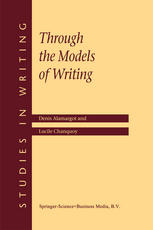

Most ebook files are in PDF format, so you can easily read them using various software such as Foxit Reader or directly on the Google Chrome browser.
Some ebook files are released by publishers in other formats such as .awz, .mobi, .epub, .fb2, etc. You may need to install specific software to read these formats on mobile/PC, such as Calibre.
Please read the tutorial at this link: https://ebookbell.com/faq
We offer FREE conversion to the popular formats you request; however, this may take some time. Therefore, right after payment, please email us, and we will try to provide the service as quickly as possible.
For some exceptional file formats or broken links (if any), please refrain from opening any disputes. Instead, email us first, and we will try to assist within a maximum of 6 hours.
EbookBell Team

4.4
72 reviewsERICESPERET University of Poitiers, France Denis Alamargot and Lucile Chanquoy's book offers a vivid and original presenta tion of main trends in the research field devoted to writing. First, it provides both young and senior scientists with a comparative view of current theoretical models of composition, with different levels of reading made available: each element of these models is clearly situated in its historical context, and scrutinized in its further evo lution. Second, this well documented theoretical analysis of writing mechanisms is checked against empirical data extracted from a lot of updated experimental studies; and lack of necessary data is thought to be underlined and defined when noted. Following the usual description of writing phases initially proposed by Hayes and Flower, the first part of this book presents planning, translating and revision processes and compares them to other researchers' conceptions (from Bereiter and Scardamalia, to Kellogg or Galbraith). Such presentations of isolated models do ex ist in literature; but the present work really gives a good comparative analysis of components inside each of models, in a clear and cumulative way; a fine-grained ob servation of differences between similarly-looking models is also performed.